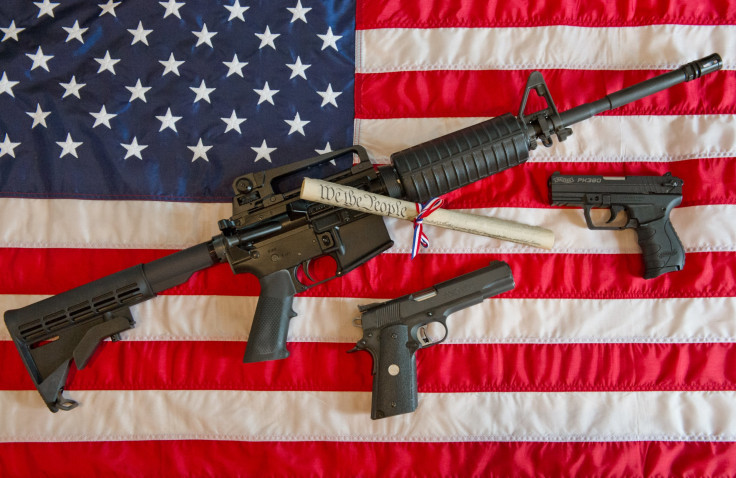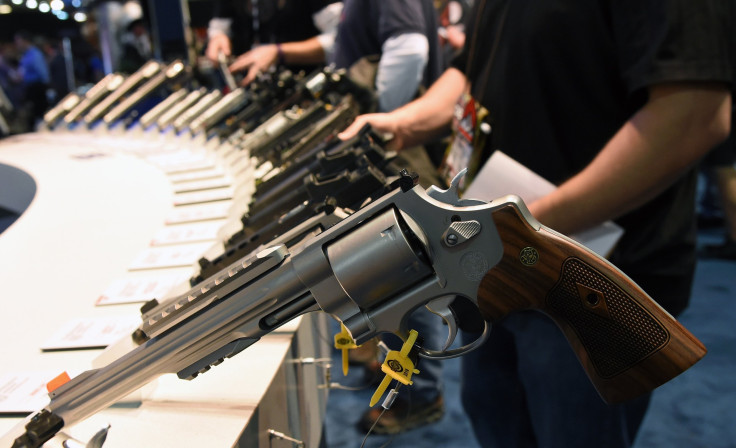Orlando Nightclub Shooting: Gunmakers Smith & Wesson (SWHC), Ruger (RGR) Shares Surge

UPDATE: 4:15 p.m. EDT — Two major U.S. gun manufacturers saw their shares surge Monday. Smith & Wesson Holding Corp. (NASDAQ:SWHC) closed the day up $1.47, or 7 percent, at $23, while shares of Sturm, Ruger & Co. (NYSE:RGR) finished with a gain of $4.88, or 9 percent, rising to $62.
UPDATE: 9:55 a.m. EDT — Two major U.S. gun manufacturers saw shares rise Monday after the opening bell in New York. Smith & Wesson Holding Corp. (NASDAQ:SWHC) gained $1.31, or 6.12 percent, by 9:50 a.m. EDT. Sturm, Ruger & Co. (NYSE:RGR) was up $4.44, or 7.74 percent.
On the London Stock Exchange, the global security giant G4S saw shares drop by 5.02 percent after it emerged that the company had employed Orlando gunman Omar Mateen, who killed 49 people in a gay Florida nightclub. Police later shot and killed Mateen.
Original story:
Shares in major U.S. gun manufacturers rose Monday in early trading on the heels of Sunday’s mass shooting at a gay nightclub in Orlando.
Smith & Wesson Holding Corp. (NASDAQ:SWHC) was lately up by $1.69, or nearly 8 percent. The Springfield, Massachusetts, firearm company, whose pistols and revolvers are standard issue for police and military forces worldwide, reported about $552 million in 2015 annual revenue.
Sturm, Ruger & Co. (NYSE:RGR) gained $2.47, or 4.3 percent, in the premarket period. The Southport, Connecticut, manufacturer, more commonly known merely as Ruger, sold more than $544 million in rifles, pistols, revolvers and accessories in 2015.
Premarket trading occurs in the hours leading up to the regular trading session, which begins at 9:30 a.m. on the New York Stock Exchange and Nasdaq. Investors and traders often watch premarket activity for clues about the strength and direction a company or industry might take during regular hours.

Weapon sales tend to spike following mass shootings and terrorist attacks as buyers seek to protect themselves from future assaults or anticipate greater gun control. The early-morning rampage at Orlando’s Pulse nightclub, which left 49 people dead and more than 50 injured, is considered the worst mass shooting in U.S. history.
It’s also the 133rd mass shooting to happen in the United States this year alone, according to the Gun Violence Archive. The nonprofit group uses the FBI definition of a mass shooting: a single event where four or more people are shot although not necessarily killed. The tally does not include the shooter.
The gunman behind Orlando’s attack, Omar Mateen, had pledged allegiance to the Islamic State group before firing his AR-15 assault rifle into the crowded club. Mateen was killed after taking hostages during the assault.
Tragedies alone, however, aren’t the biggest booster of gun sales. A recent New York Times analysis found that fear of gun-buying restrictions has been the main driver of spikes in gun sales.
Sales of handguns and other firearms surged in December to 1.6 million guns after President Barack Obama called for restricting assault weapon sales in the wake of the terrorist attack in San Bernardino, California, which left 14 people dead and 22 others seriously injured. More guns were sold that month than almost any other month in nearly two decades, according to a Times review of federal data.
“President Obama has actually been the best salesman for firearms,” Brian W. Ruttenbur, an analyst with BB&T Capital Markets, a financial services firm, previously told the newspaper.
© Copyright IBTimes 2024. All rights reserved.





















